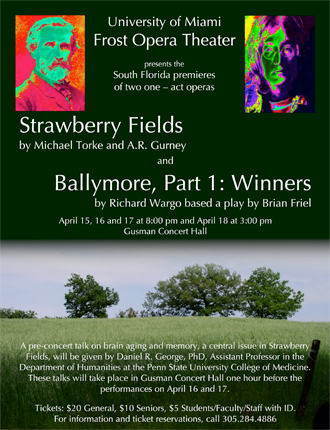
UM Makes Case for American Opera
Tomorrow night, the University of Miami’s Frost Opera Theater will present two one-act operas by American composers in what will be their South Florida premieres.
Strawberry Fields, by Michael Torke, was broadcast on television about 10 years as part of a trilogy of American operas about New York’s Central Park, and it’s the sad but sweet little story, written by veteran playwright A.R. Gurney, of a woman with Alzheimer’s who comes to the park and thinks she’s at the opera house. A student there befriends her, advocating the work of John Lennon, memorialized at the Strawberry Fields section of the park.
Her memories of sitting in the opera house waiting for the music to start, and her love of Verdi, meld with the student’s championing of the slain Beatle, and the result is an ode of sorts to the power of music and art in our lives.
The other, Ballymore, Part I: Winners, is by Richard Wargo and is based on the first part of Irish playwright Brian Friel’s Lovers. It has to do with a teenage couple in Northern Ireland who are to be married and are planning their lives together, but the audience discovers through the medium of a pair of ballad singers that the two will die later that day in a boating accident.
Both of these operas are written in a warm tonal style that has proven much more palatable to contemporary audiences than the atonal works of a generation ago, and no doubt that makes it easier to mount them as well, and not just in a university setting. In fact, despite the economic troubles faced by opera companies hereabouts and across the country, opera seems to me, anyway, to be an increasingly popular art form. Technology has come to its rescue, making it much more available than it used to be (it took no time at all to find the two YouTube excerpts, for instance).
But what remains to be done is for American opera to get a greater foothold in performing companies. They’re being done all the time – and Florida Grand Opera will conclude its upcoming 2010-11 season with one of them, David DiChiera’s Cyrano (2007), based on the familiar Edmund Rostand play – but I don’t see a lot of evidence that many of them are establishing themselves as regular repertory pieces in the nation’s companies.
George Gershwin’s Porgy and Bess and Carlisle Floyd’s Susannah (which premiered at Florida State back when Floyd was teaching there in the 1950s) are the most popular American operas, and Gian-Carlo Menotti’s Amahl and the Night Visitors still gets regular outings at Christmastime. Samuel Barber’s Vanessa is well-known for parts of its music if not as much for the opera itself, and there has been a great deal of attention paid to the work of John Adams (Dr. Atomic, Nixon in China), Tobias Picker (Emmeline), Mark Adamo (Little Women) and others in recent years.
But you don’t see most opera companies regularly scheduling any of these pieces, and that is what it means to really be a part of the canon, as many writers on this topic have pointed out. Perhaps this week’s University of Miami performances will go some way to changing that situation.